via Jao Odicta | The QuantumCopyedited by: Orange Alcaraz Pasay City National Science High School representatives from different organizations including Yes-O, Sentience, Girl Scouts of the Philippines (GSP), and science faculty teachers gathered 10kg of wood and 50kg of plastic in the 40th International Coastal Clean-Up Drive at SM MOA By The Bay, held on September 20, 2025. In cooperation with the Department of Environment and Natural Resources (DENR), SM, and SM Cares at Pasay City Environment and Natural Resources Office (PCENRO), brought together representatives from different organizations to help clean the area. Photos: Gabrielle Ayesha Nicolas, Adam Concepcion
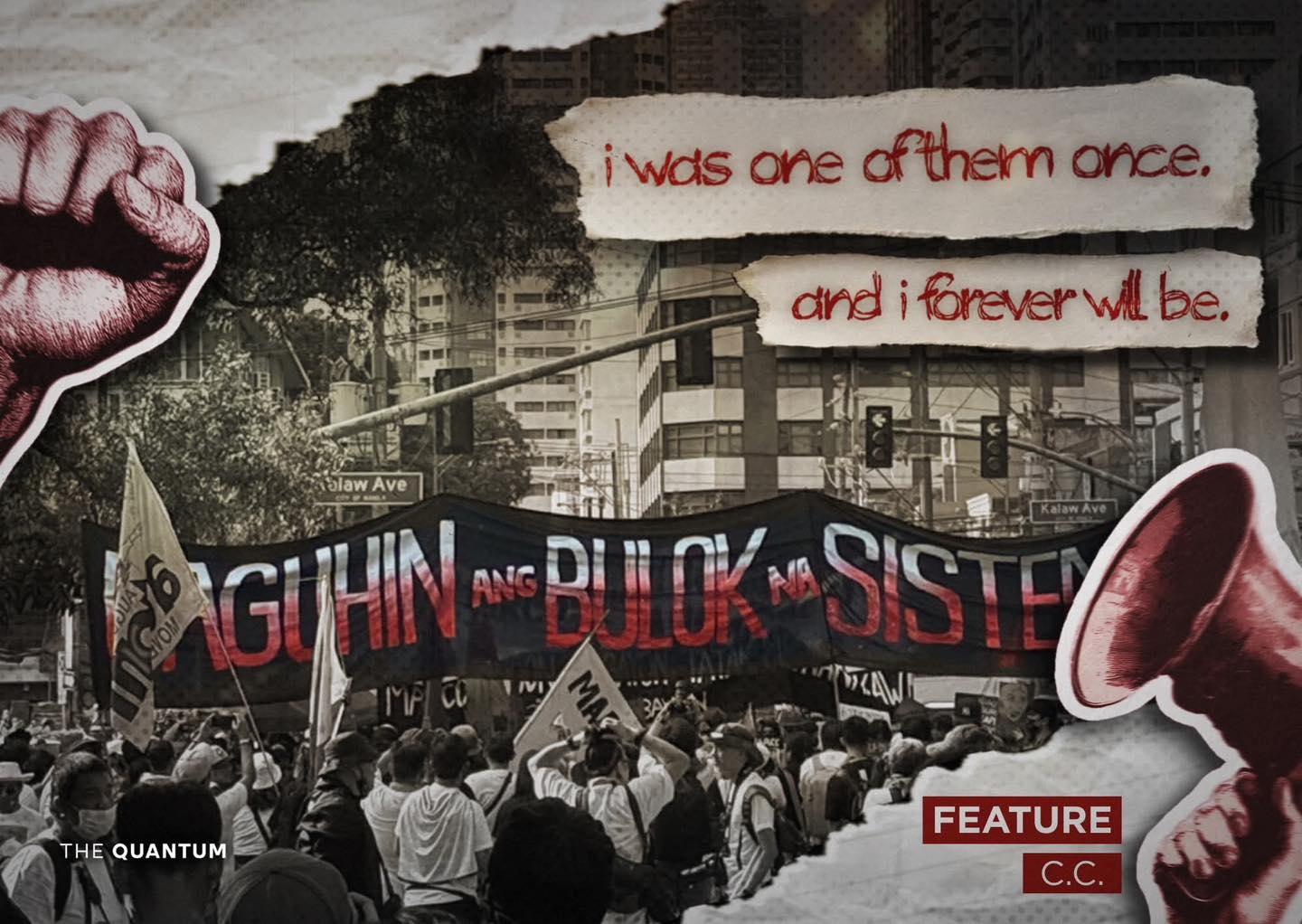
One of Them
by: Chloe CristobalCopyedited by: Joebbie GauganoPublication by: Jamelle Ronquillo The streets are crowded, cultivated, and booming with cries of protests. They march with a proud stride that shakes the ground they step on. Their voices echo the pleas of every generation that’s witnessed injustice. Their signs make the roads like a sea of colors, each one representing a fervent desire for change. They didn’t just walk; with them, they carried the fury of the betrayed, the wishes of the unheard, and the dreams of the forsaken. Today, the city of Manila is not just protesting—it is remembering, demanding, and hoping. I was one of them once. But now, the weight of years lived weighs down my shoulders. The fire burning in my chest now causes my heart to ache. The hands I raised in protest now tremble with age—but not with fear. Never with fear. I watch from the window as they surge forward. Students, workers, artists, and elders walked side by side. People of different skin, backgrounds, orientations, and jobs held each other’s hands as they screamed and demanded. Their differences dissolved in the unity of purpose and passion. The atmosphere pulsed with phrases that refused to be ignored, each syllable a strike against suppression. And oh, how I longed to feel that relentless inferno in my chest once again. I was one of them once, and I wish I was marching with them right now. Though my heart relishes the fact that the spirit I carried still lives on. That the chants I used to shout are louder and bolder as they utter them. That the streets I walked with trembling hope are now filled with unwavering conviction. A conviction that’s lasted for decades because of corruption that has been persistent … the more I think about it. I cannot help but ask why the battle we fought is being passed on to the children we promised a better future. I was one of them once, and it breaks my heart to see that there is still a need for mass laments like these. The echoes of cries grow louder, but the people who sit atop remain unmoved and apathetic. The faces in the crowds differ, even multiply, but the pain they carry and show seems hauntingly familiar. The systems we fought to change seem to bounce back and grow even stronger, fueled by greed, nepotism, and indifference. Yet, even as these thoughts weigh heavy on my soul, as I look back out the window, I realize that I find solace in the march itself. In the rhythm of resistance. In the defiance they show. In the truth that every step taken today means something for the people. In the fact that every voice raised is one step closer to achieving change. I was one of them once, and I forever will be. I sit in my chair watching as the crowd slowly evaporates and heads on to the next corner. My heart burns with sorrow and pride, for as long as the battle persists, so does our spirit. And maybe this time around, their yells will reach even those who turn their backs to the sound.
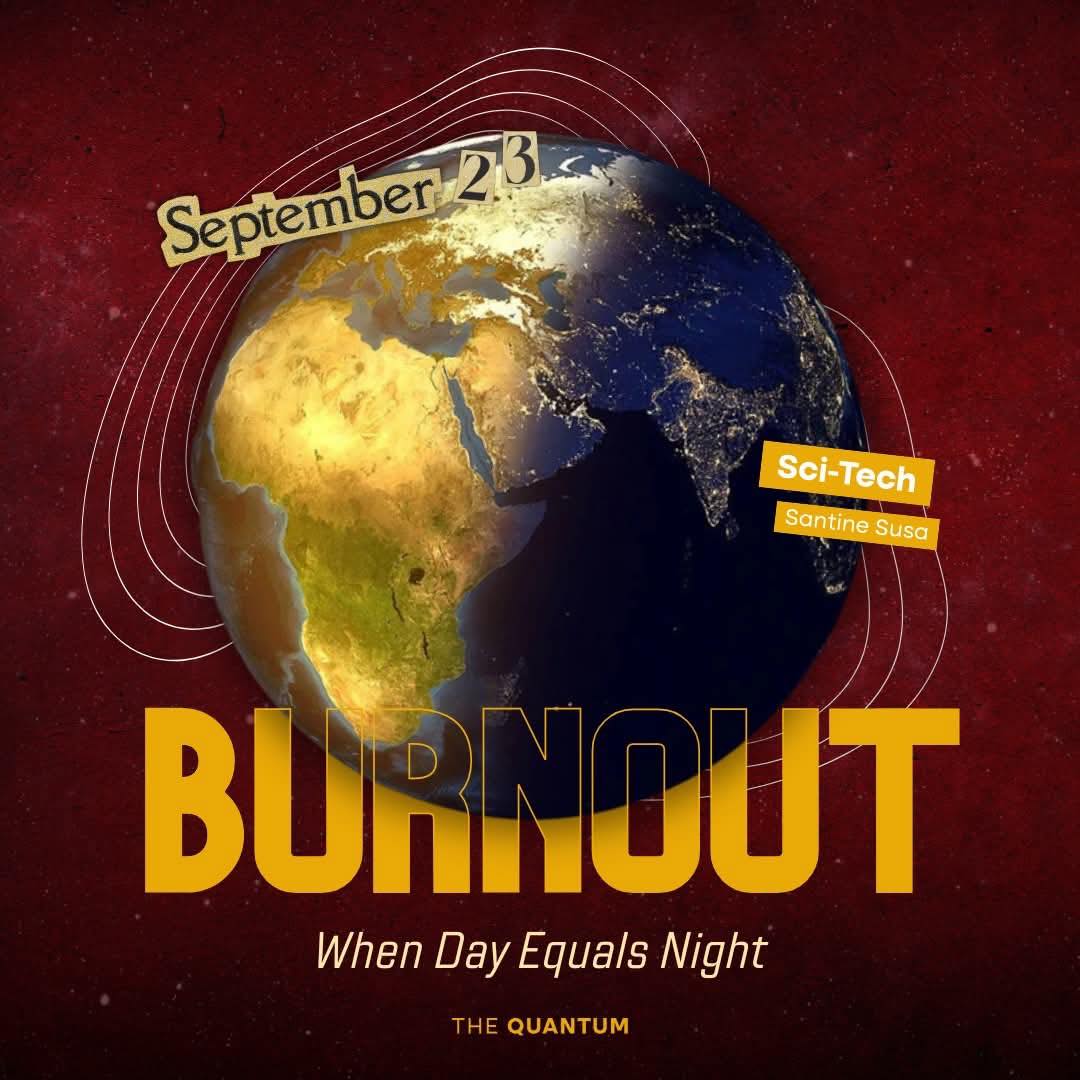
Burnout: When Day Equals Night
by: Santine SusaCopyedited by: Ayesha RonquilloPublication by: Yelena Fabricante On or around September 21-24, Earth experiences the September equinox, a moment when the Sun crosses the celestial equator heading southward. During this instant, day and night are nearly equal in length worldwide, hence the term equinox, Latin for “equal night.” In the Northern Hemisphere, it marks the start of astronomical autumn, while in the Southern Hemisphere it signals spring’s arrival. The balance of sunlight influences atmospheric circulation, ocean currents, and seasonal weather patterns. Farmers, navigators, and ancient civilizations once tracked the equinox to plan harvests and ceremonies, and modern astronomers still use it as a reference point in the sky’s coordinate system. The September equinox also offers opportunities for science outreach, amateur astronomers can observe the Sun’s position rising due east and setting due west, while climate scientists watch seasonal shifts in sea ice, monsoons, and animal migrations. The equinox is a reminder that, whether you’re gazing at the stars or checking your weather app, it is a silent, yet key driver of life on Earth.

A nation built on corruption
by: A.D.Copyedited by: S.C.Publication by: P.B. Last Sunday, streets were flooded not by mementos of ghost projects, but by the imprints of hundreds of thousands of Filipinos who dared defy the corrupt. Placards may be put down, streamers may be folded away, and chants may slowly fade. But this time, the people will not relent. It is no coincidence that the nationwide protests occurred on the anniversary of Ferdinand Marcos Sr.’s proclamation of Martial Law 53 years ago—an era marked by censorship, abuse, historical revisionism, and the systemic dismantling of democracy. In fact, it was the perfect juncture to call out the brazen robbery of trillions and demand long-overdue accountability from the perpetrators. September 21 wasn’t just a famous remembrance, but a haunting reminder that the remnants of the past continue to scar the Filipinos. Corruption has always been a systemic issue. Not a recent trend, nor a political anomaly. It has been deeply entrenched in the field of governance, guarded by impunity, and has continued for decades that it might as well be an heirloom. Generations of corruption do more than just put wealth in a politician’s pocket. It erodes trust, impedes progress, and manipulates the masses to tolerate social injustices. No justification must save the regime from scrutiny. From lists of phantom projects, shady contractors, and nepo babies, to senate hearings of corrupt officials and echoes of a corrupt past—it’s as if the shameless betrayal of the public became the tipping point for the nationwide protest. When a nation has endured decades of outright theft, anger, distrust, and indignation inevitably take root—and are passed down to future generations. Youth inherit broken systems and are left to fix damages they didn’t cause. Because when the youth have their present stolen, they rise to fight for their future. And the streets heard them. Banners were raised, chants were echoed through every avenue, and rallies were led by compassionate youths, sectoral groups, and societal organizations. And fittingly, it all unfolded on the Martial Law anniversary. But this year, September 21 was no longer about lamenting the past; it’s about confronting the injustices of the present. The recent protest recounted that stolen past and cried out, “Never forget.” It stood against a myriad of grievances—ignorance towards agriculture, a flawed education system, and corruption, among many others—and they roared, “Never again.” Was this march finally a break in the pattern, or are we doomed to repeat the cycle of outrage and forgetting? Frankly, the answer relies on our volition to remain steadfast in demanding accountability and transparency. We deserve leaders who serve the people, not their own interests. We deserve better. When the noise finally fades, there is no one to sound the alarms but ourselves. What matters most isn’t the protest, it’s what happens after. To confront the issues without animosity is worthless. Outrage without persistence dies as noise. A nation built on corruption does not weaken—it only hardens its resolve. Their defiance and determination to punish the culprits must only grow stronger. And we, then, must carry this fire until every corner of our society is free from the grips of corruption. The recent march was a testament—a testament to the people’s anger, their resentment, and their desire for change. It was a powerful warning, impossible to ignore, meant for everyone to see. Our message is clear: Condemn them. Incarcerate them. And if that sounds threatening, it is—because the future of this nation depends on it.

Muling Paghinga
| Claire Domenden| Andrea Urbina Sa katahimikan ng gabi, mayroong isang tao na isinusulat ang isang mensahe na sana’y magiging huling alaala ng kaniyang munting buhay. Sa ilang buwang pakikipaglaban sa depresyon, naniwala siyang wala nang saysay ang bukas. Ngunit sa mismong sandaling iyon, isang mensahe mula sa kaibigan ang dumating na tila ba’y isang anghel na pumipigil upang mangyari ang isang trahedya. “Kumusta ka? Nandito lang ako.” Iilang salita lamang ngunit naging rason ito upang muling kumislap ang pag-asa na matagal nang nawala. Bunsod nito ang unti-unti niyang pagkatanto na hindi siya nag-iisa, na mayroong mga taong handang makinig at umalalay. Kalauna’y natutuhan niyang huminga muli, magpatingin, at tanggapin na ang kasalukuyang nararanasan ay hindi kahinaan bagkus ito’y bahagi ng isang laban na maaari niyang mapagtagumpayan. Sa paggunita ng National Suicide Prevention Month, dala niya ang aral na mahalaga ang mental health gaya ng ibang bahagi ng ating katawan. Higit sa lahat ay naramdaman niyang mayroong mga kamay na laging handang umalalay, at mga balikat na maaaring sandalan mula sa mga kaibigan at pamilya hanggang sa mga propesyonal. Kaya ngayon at sa mga susunod na bukas ay maalala sana natin na hindi masamang huminga at magpahinga.
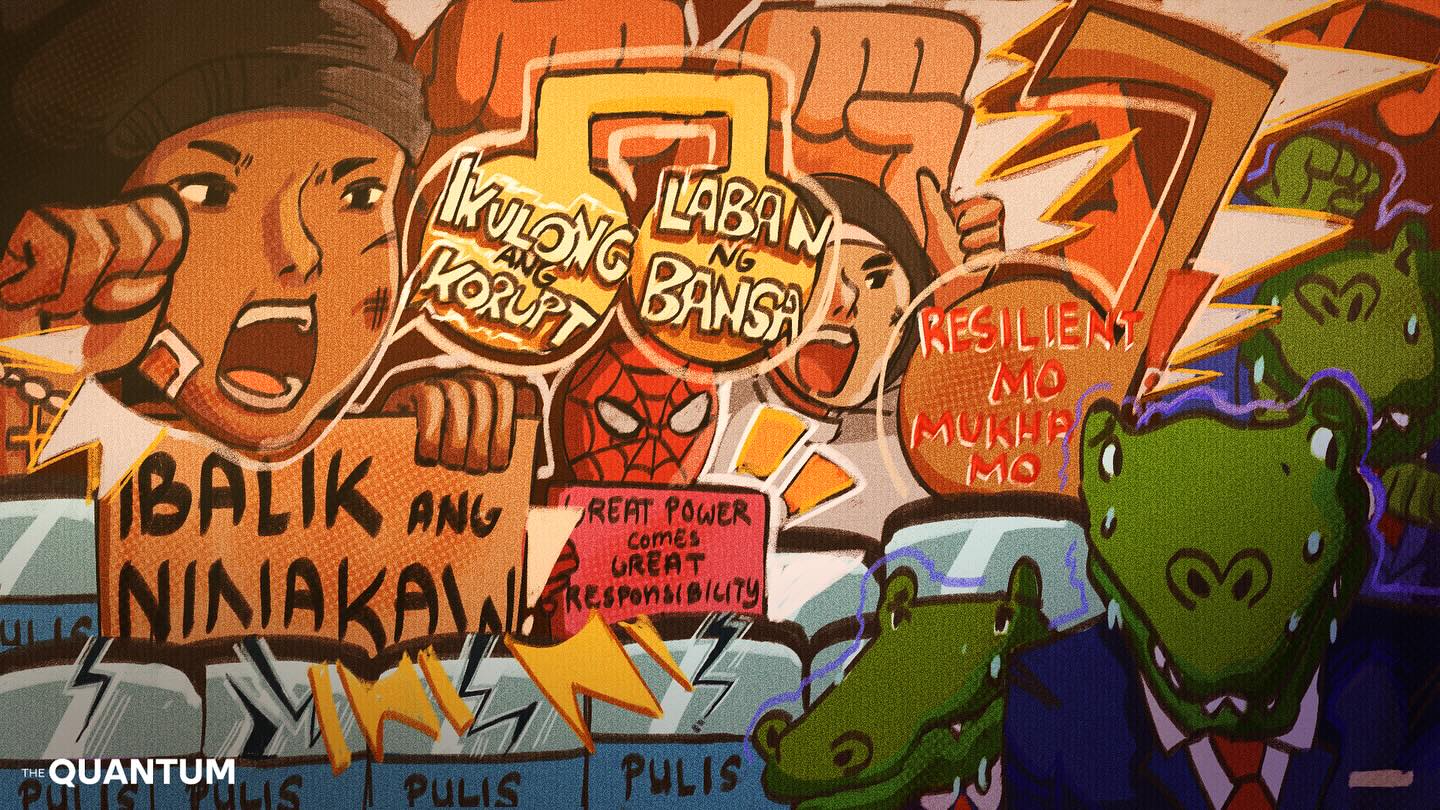
Song of Angry men
by: Rhian TabuadaCopyedited by: Jeyana Sophia CaparrosPublication by: Chesca Domondon Do you hear the people sing? The people who sing the song are the angry men who walk along the roads with posters and cardboards raised above their heads. Do you hear them? Do you hear me? Do you hear my people as we walk through neck-deep floods, our bodies soaked from head to toe with polluted water, leaving us dirty in mud as we make our way to our destination? Tell me—do you hear us? Or are you like them? The ones who cover their eyes, the ones who cover their ears, and the ones who cover their mouths. Do you also wash your hands, convincing yourself and those around you that what I experience is not your problem? Tell me. Or will you continue to remain oblivious? We have suffered for far too long. How about us? You who sit high and mighty in your golden throne, throwing scraps and pieces of whatever gold you spend, laughing away as you see us as pathetic and desperate as we chase after with what you can offer to give us. We have been in poverty for so long. We can only suffer in silence as you take everything until you are finished and full, your pig belly as wide as the piggy bank that you keep—inside is the money that should have been for the people. The money that should have been for the country, for the children, for the needy. I can only stare as I float through the muddy water, watching as you pass by with your precious chariot; your head up high as you only see what is at the top—the same thing that my people and I are chasing after. How long will you remain cruel? How long will we remain submerged in these waters, drowning and unheard, only the bubbles from our choked-out gasps surfacing? You pop our cries and watch as we drift lower down to our demise, yet you soar through the sky. I hope that you end up like Icarus. That soon your wax wings would burn, and you would suffer the same fate as us. In pain, drowning, and soon to be forgotten. May the masses utter the sentence of your crimes, that you shall be punished for your wrongdoings. My hands and my fellow men will eagerly accept your fall from grace, and we will drag you down with us.
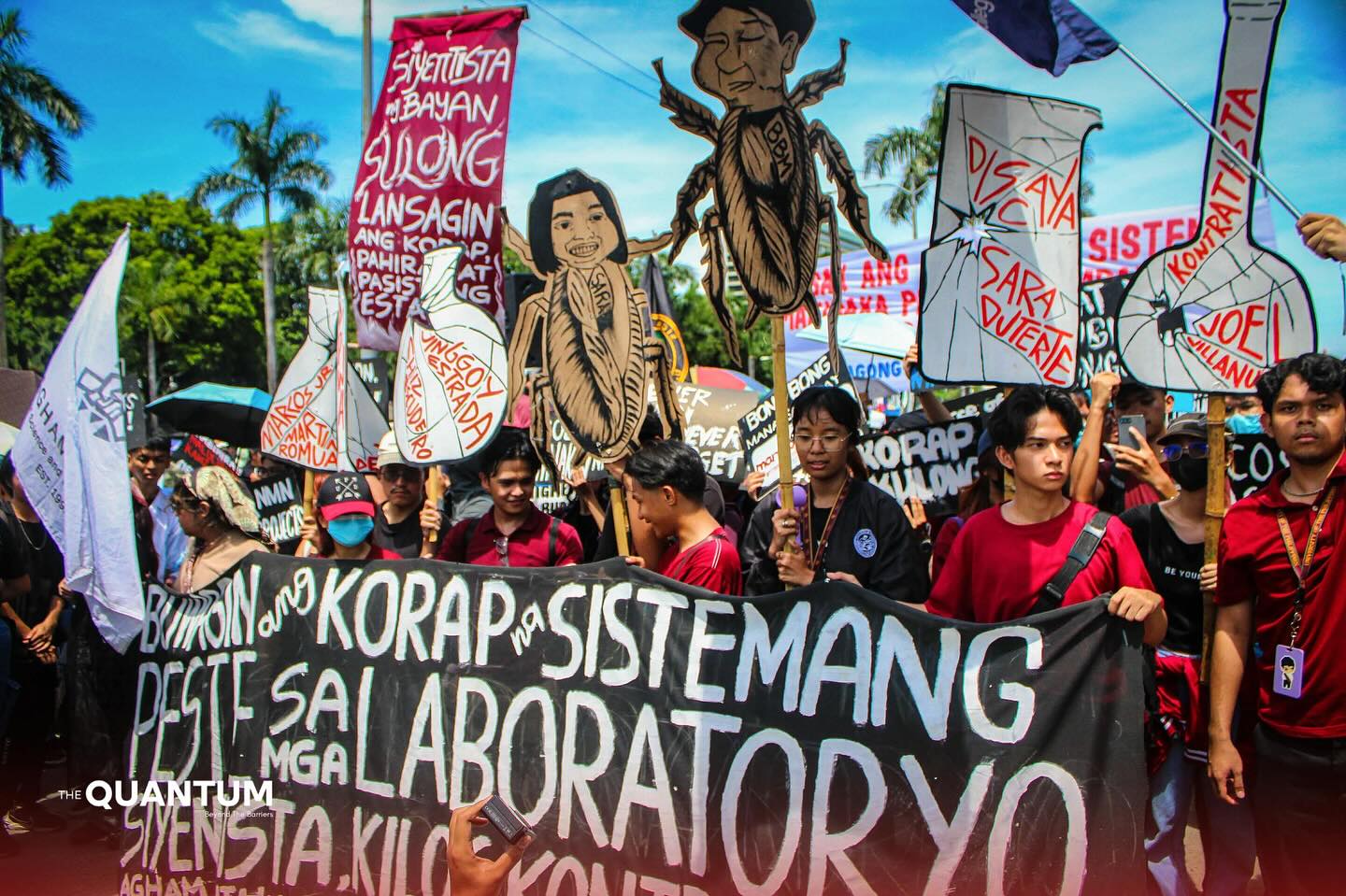
Baha sa Luneta
via Jed Palonpon & Elyzza Esteban | The QuantumPhotos by: Jed Palonpon The spirit of People Power flooded the streets today as the nation marked the 53rd year since the declaration of Martial Law. From Luneta to EDSA and across the country, thousands of enraged Filipinos rose as one—demanding accountability, crying out against corruption, and refusing to be silenced. The people’s fury burned against the anomalies of multi-trillion–peso flood control projects, the shameful budget cuts in education, the relentless human rights abuses, and countless betrayals by those in power. Today, the message is clear: we will not bow to tyranny, we will not be fooled by corruption, and we will never again allow history’s darkest days to return.
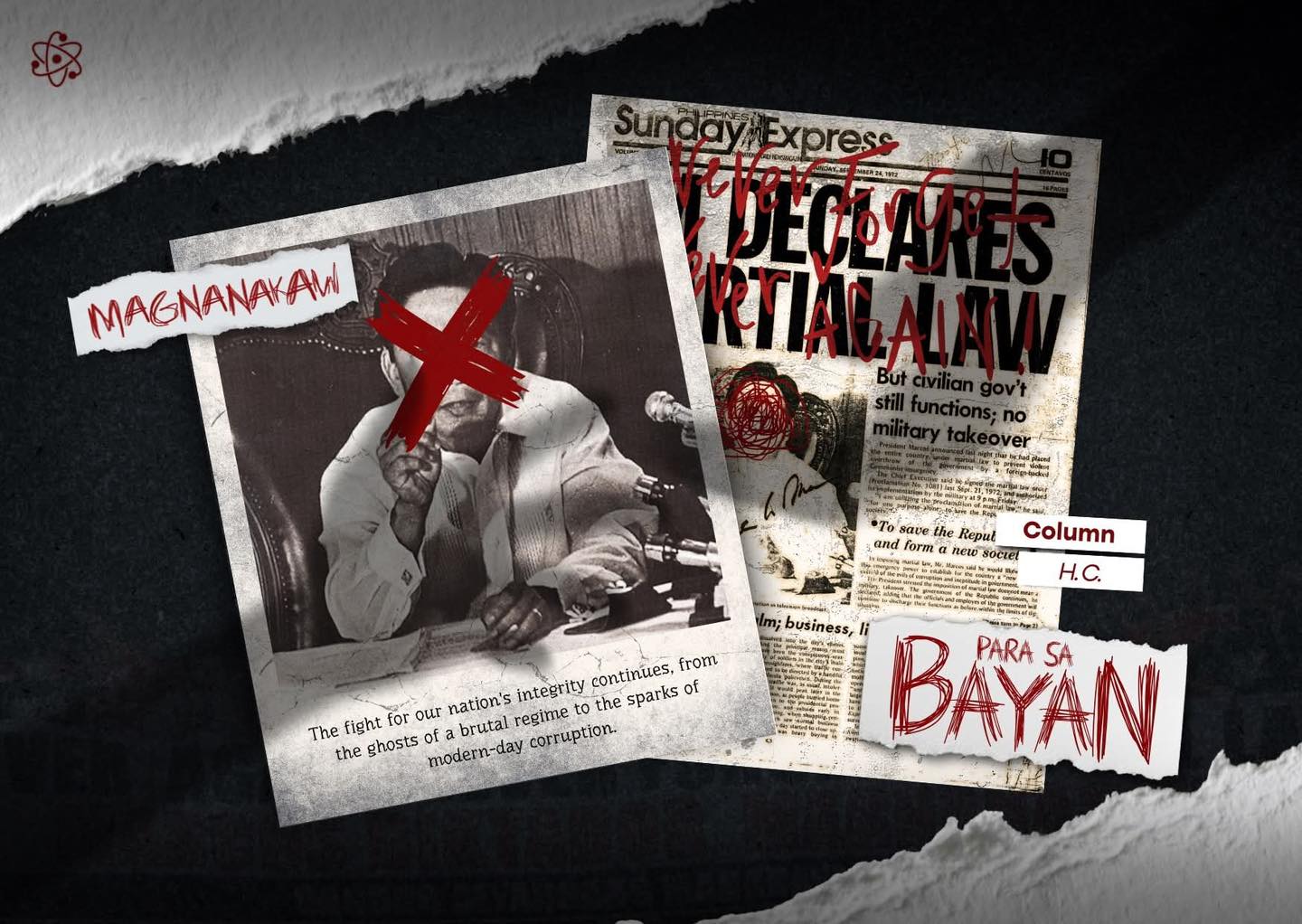
Martial Law
Today, we commemorate the 53rd anniversary of the declaration of Martial Law, a period marked by atrocities and killings that undermined the democracy and independence of the Filipino people. This chapter in our history serves as a reminder of the dangers of unchecked power and the suppression of dissent.Yet, the lessons of the past seem to be fading. A recent survey from WR Numero revealed that 56.5% of Filipinos view the Martial Law era positively, a testament to the developing historical revisionism that influences our nation. This statistic is not a phenomenon that is ignorable, but rather a starting point where new forms of injustice and rejectionism can grow. This year’s commemoration is not just about looking at our past but also reflecting on its ideals in our present. As investigations into flood control and other corruption allegations continue, we see the echoes of Martial Law’s abuse of authority through the rampant corruption in our government. While communities are submerged and lives are disrupted, billions of pesos meant for public welfare are allegedly absorbed into private pockets, a breach of commitment to Filipinos. In response, the Filipino public are once again taking to the streets and using social media to voice out the sentiments that those in power are trying to erase. Students have walked out of their classrooms, netizens use social media to call out public officials and their immediate families, and the whole populace, to the best of their ability, is protesting and demanding accountability. These demonstrations, set amidst the Martial Law anniversary, signify a renewed awakening and a refusal to be silenced. The fight for our nation’s integrity continues, from the ghosts of a brutal regime to the sparks of modern-day corruption. We, the students, stand at the forefront of this battle, armed with the memory of the past and the unwavering hope for a just future. We must not let history repeat itself through our ignorance or our silence. As always, Never forget. Never again.
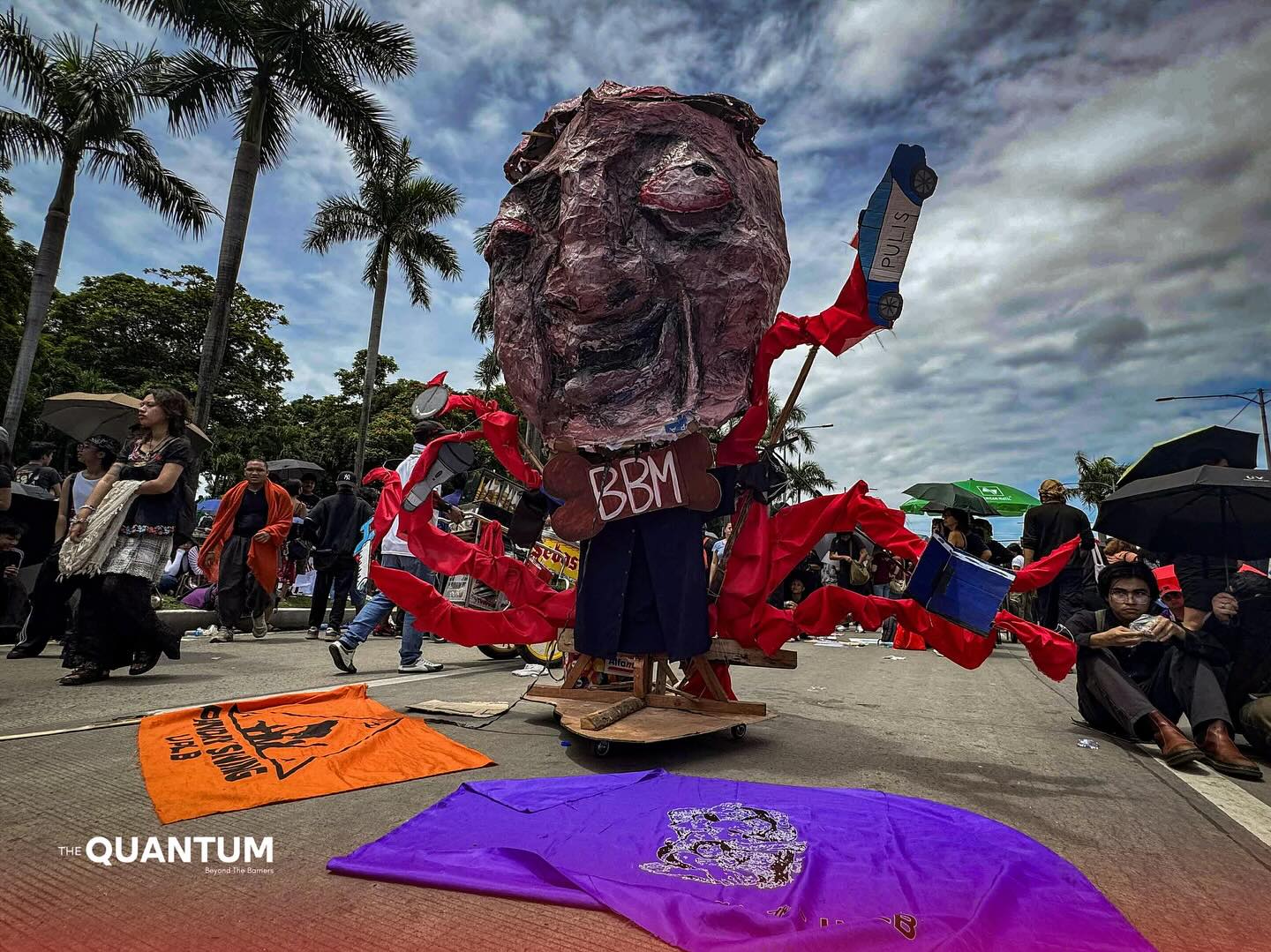
People Power
via Mark Balolo | The QuantumPhotos by: Mark Balolo and Aliyah Lopez To commemorate the 53rd Anniversary of the declaration of Martial law, Protesters march in Luneta Park, urging government accountability for flood control corruption and continuous misuse of public funds.
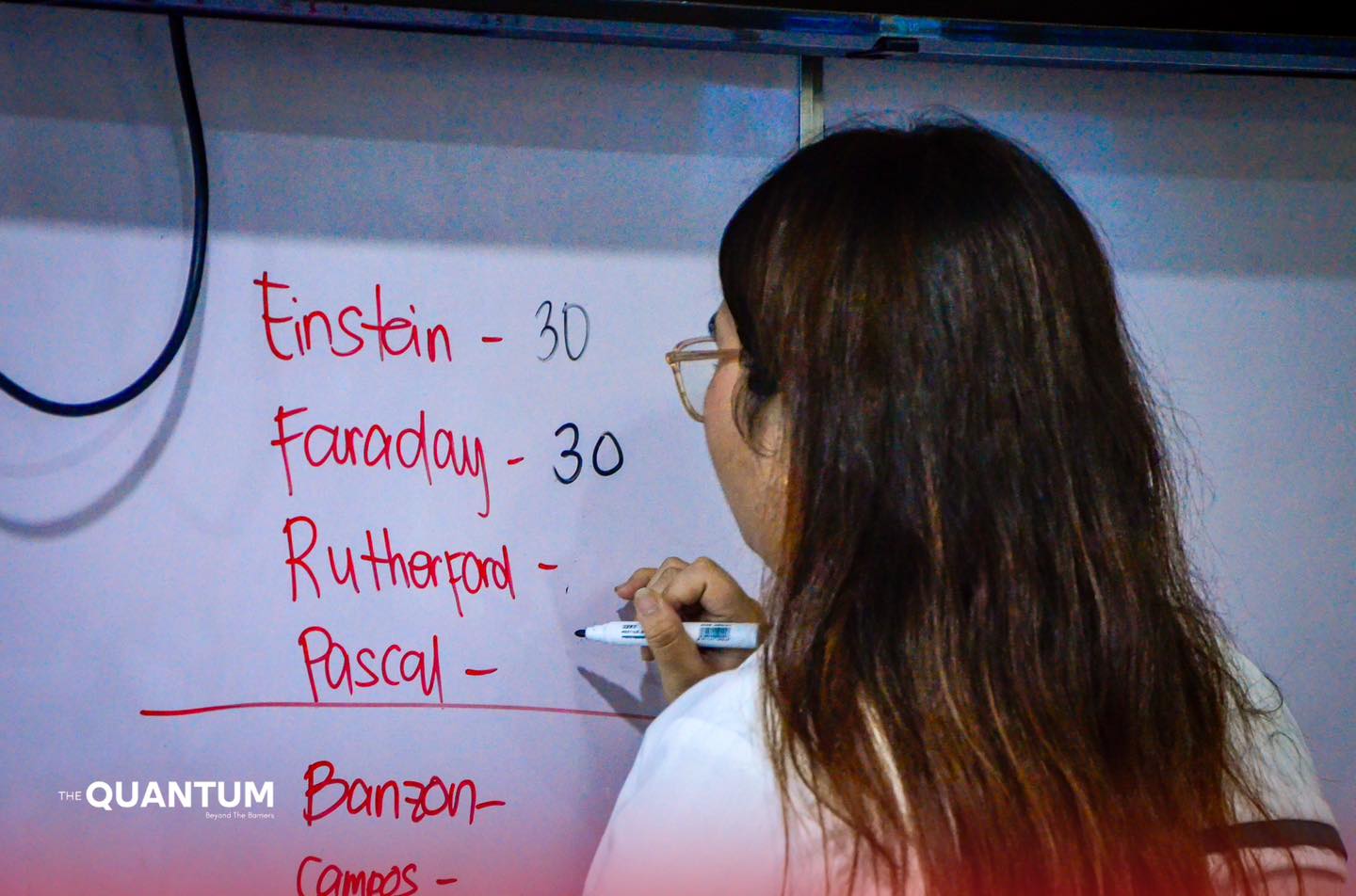
PCNSciHS holds elections for PO Male and Grade 7 Representative
via Emmanuel Salazar | The QuantumPhotos: Santine Susa, Aliyah Lopez, Ryza Anabo The elections for the Grade 7 Representative and Protocol Officer (Male) of the Pasay City National Science High School’s Supreme Secondary Learners’ Government was conducted by the LG COMEA on September 17, 2025. Election was done via ballot voting during selected class periods. The room-to-room campaign prior to the election began on September 16.




